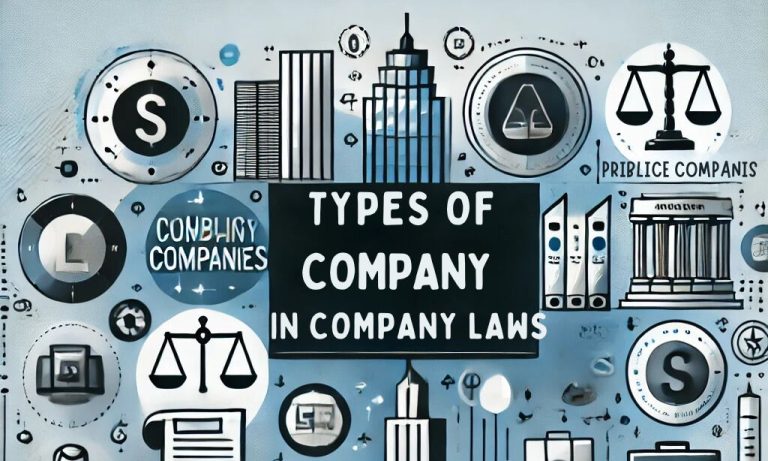Once one analyses the structure of any business or organization, people usually wonder about the type of legal framework under which they operate. The companies and types of company in company law can assist in clarifying and showing the different structures regarding the legal implications with which each one comes laden. In company law, the company is essentially viewed as a legal entity in terms of its members, made into the business, entering contracts, and owning property. There are rules, rights, and obligations for each type of company. This article breaks down the different types of company in company law, their characteristics, and other key details to help you understand how companies operate in a legal context.
What is Company?
A company, in legal terms, is a group of individuals who come together to carry on a specific business or activity. It is an entity created under the company law of a country, with a distinct identity from its members. The company can enter into contracts, sue or be sued, and own property in its name. Companies provide a structure for business operations and are subject to various laws that define their formation, management, and dissolution.
In general, companies are categorized by their structure and legal formation. These categories help in understanding the responsibilities of the members, the risk involved, and the level of governance required.
Types of Company in Company Law
Types of company in company law can be broadly classified into several categories, depending on various factors such as liability, ownership, and legal formation. Let’s dive deeper into these categories:
Private Company
A private company is one that restricts the transfer of its shares and has a limited number of shareholders. Private companies cannot invite the public to subscribe to their shares or debentures. They are usually formed by small groups of people who want to retain control over their business.
- Key Features: Minimum of two shareholders and a maximum of 200. Cannot offer shares to the public. Limited liability for its members. Easier to manage and less regulated than public companies. Shares can be transferred only with the approval of the other shareholders.
Public Company
Public companies are those that allow the general public to buy their shares. These companies are listed on stock exchanges and are subject to higher regulations. They are usually larger and have a more diverse shareholder base compared to private companies.
- Key Features: A public company can raise capital from the public. Requires a minimum of seven shareholders. Shares are freely transferable. Must comply with strict regulations regarding governance and disclosure. Limited liability for shareholders.
One-Person Company (OPC)
Introduced in India, the One-Person Company (OPC) allows a single individual to form a company. It is a hybrid model between a sole proprietorship and a private company, giving the owner limited liability while allowing complete control over the company.
- Key Features: Only one shareholder and one director are required. Limited liability protects the owner’s assets. Easier to form and operate compared to a private company. Cannot have more than one shareholder.
Limited Liability Partnership (LLP)
An LLP combines elements of a partnership and a company. It provides limited liability to its partners, meaning they are not personally liable for the company’s debts. LLPs are popular for small businesses and professionals like lawyers and accountants.
- Key Features: Minimum of two members. No maximum limit on the number of partners. Partners have limited liability. No requirement for a board of directors. Flexible structure with less stringent regulatory requirements.
Non-Profit Company
A non-profit company is formed to promote charitable, religious, or educational activities. It does not operate for profit, and any income generated is reinvested into its cause.
- Key Features: Focus on social, educational, or charitable activities. Cannot distribute profits to members. Must adhere to specific regulations governing non-profits. Exempt from certain tax liabilities.
Government Company
A government company is one in which the government owns more than 50% of the share capital. These companies are formed to carry out commercial activities that may not be feasible through direct government departments.
- Key Features: Owned or controlled by the government. Subject to both company law and government regulations. Operates for commercial purposes. Includes public sector undertakings (PSUs).
Features of Company Law
Company law governs the formation, management, and dissolution of companies. It outlines the legal rights and obligations of shareholders, directors, and officers, ensuring that businesses operate transparently and in compliance with the law. Here are some key features of company law:
- Legal Entity: A company is a separate legal entity distinct from its members. This means that it can own property, enter into contracts, and take legal action in its name.
- Limited Liability: One of the most significant advantages of company law is the concept of limited liability. Shareholders are not personally responsible for the debts of the company beyond the amount invested in it. This provides protection to individuals who invest in the company.
- Perpetual Succession: A company has perpetual succession, meaning that its existence is not affected by the death, insolvency, or departure of its members. It continues to exist even if the ownership or management changes.
- Transferability of Shares: In companies such as public companies, shares are freely transferable, allowing shareholders to buy and sell their stakes in the business. This promotes liquidity and can help attract new investors.
- Corporate Governance: Company law ensures that companies adhere to specific governance structures, including the roles and responsibilities of directors, the conduct of meetings, and the protection of shareholder interests. Governance regulations vary between private and public companies.
Companies in Company Law FAQs
What is the difference between a private company and a public company?
A private company cannot offer shares to the public, whereas a public company can raise capital by selling shares to the public.
What is an OPC in company law?
An OPC (One-Person Company) allows a single person to form a company with limited liability. It provides more flexibility than a sole proprietorship.
How is an LLP different from a private company?
An LLP (Limited Liability Partnership) provides limited liability to its partners, but it is less formal than a private company and does not require a board of directors.
Can a non-profit company make profits?
No, a non-profit company cannot distribute profits. All income must be reinvested into the organization’s mission.
What are the legal obligations of a government company?
A government company is owned by the government and must comply with both company law and specific government regulations related to public sector undertakings.


